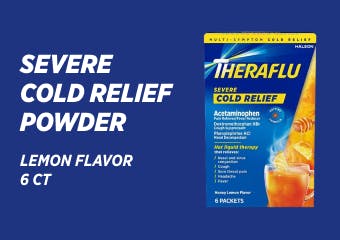What Causes Flu Headaches?
If you are experiencing a headache while recovering from the flu, there may be a number of factors causing it. Here are some things that could be causing your flu headache:
Headache as a Flu Symptom
The flu itself may be the culprit of your head pains. Headaches and muscular or body aches are all common symptoms of the flu.1 Because the flu has a sudden onset, you may experience a headache and other symptoms very quickly after catching the virus.1 Although cold and flu symptoms are very similar, headaches rarely occur as a symptom of a cold.1 If you are sick and have a headache, it is more likely caused by the flu.1
Dehydration Headaches
Some flu symptoms can put you at risk for dehydration.1,2 Having a fever can dehydrate you, and higher fevers lead to more dehydration.2 Diarrhea and vomiting, which are flu symptoms that are more common in children, can cause water and electrolytes to leave the body in a short amount of time.1,2 Lack of fluids can lead to dehydration headaches, which is why it’s important to stay hydrated when you have the flu.3 Even mild dehydration may cause a headache, so make sure to keep a glass of water with you at all times.3
Cough Headaches
If you are coughing, sneezing or blowing your nose a lot, you may develop a cough headache.4 Cough headaches are not very common and typically last from one second to 30 minutes.4 The exact cause of cough headaches are not known, but one possible theory is that coughing raises pressure in the chest and abdomen which leads to increased pressure in the brain.4 Cough headaches are harmless and usually do not require treatment.4
Sinus Headaches
Sinus infections are moderate complications that can occur after the flu.1 A sinus infection can lead to a sinus headache, which may feel like a dull, constant ache behind your eyes or in your forehead.5 Sinus headaches usually go away on their own after a week, but a lasting sinus headache may require medication from your health care provider.5 Treating the underlying cause of a sinus headache is the best way to get rid of it, but you can use decongestants or a warm compress to lessen the pain.5
Stress and Lack of Sleep
Having the flu can be a stressful experience. Aside from dealing with painful symptoms, you have to put your life on hold and step away from responsibilities like work and chores. Stress can cause tight muscles in the shoulders and neck, which often leads to a tension headache.6 Plus, if stress and symptoms are keeping you from feeling rested, the lack of sleep can also trigger tension headaches and migraines.6 A good nap is often helpful for treating a headache, so try to get plenty of sleep while working toward recovery.6
Intense and Lasting Flu Headaches
If you are already prone to chronic migraines, a flu can exacerbate the pain of an existing migraine.7 Talk to your health care provider about finding ways to manage chronic migraines. Headaches that continue after a flu can be a sign of a serious complication that requires emergency care.7 If your headache persists after recovering from the flu, you may need to seek emergency care.7
How to Treat Flu Headaches
Drinking water and getting plenty of rest will help you manage your headaches and other flu symptoms.8 Using over-the-counter medications that contain acetaminophen can help lower your fever and relieve headaches as well.8 To increase your fluid intake and help relieve head pain, try a warm cup of Theraflu Daytime Flu Relief Max Strength Hot Liquid Powder. This great-tasting honey and lemon-flavored formula contains acetaminophen to help headaches and dextromethorphan HBr to suppress coughs. You can also try the Nighttime Flu Relief Max Strength Hot Liquid Powder to keep symptoms at bay during the night.
Flu headaches may be a pain, but over-the-counter medications like Theraflu are great solutions for helping you manage them. Find more tips on combatting flu symptoms with Flu Resources from Theraflu.





